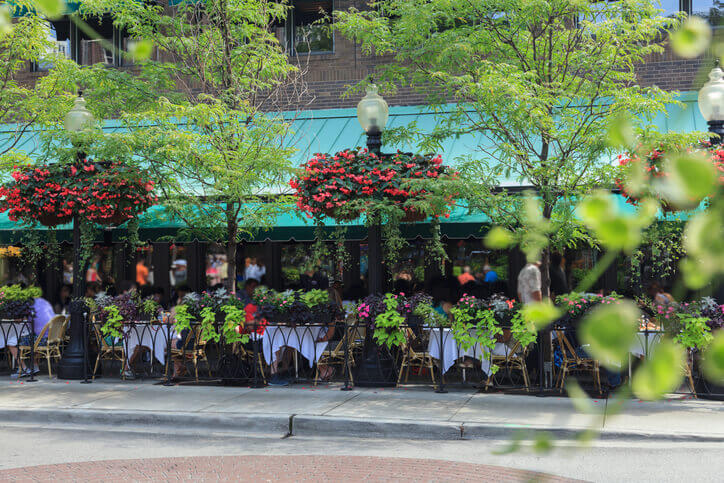The surge in outdoor dining during covid hasn’t gone away. Even before you could catch the virus inside but not outside, people love to eat outdoors. The fresh air, the sun, the rats. Wait – the rats? Yup! Outdoor dining areas are acutely attractive to rats – and mosquitoes, ticks, flies, cockroaches, yellow jackets, ants… just about every pest! They have everything a pest could need and it’s all right at their doorstep.
Some restaurants have turned some parking spaces into small eating areas called parklets. Even if parklets go by the wayside (some customers are complaining about lack of parking that comes with using spaces like that), existing outdoor dining will still be there. Even in the winter! Some restaurants have heaters and a cover over their outdoor dining area and some even have mini greenhouses with tables and chairs inside them. Doesn’t that sound lovely? Well, getting out of the cold sounds lovely to pests in the winter, too. So, how can your restaurant keep its popular outdoor dining area open while attracting less pests? Here are 7 ways to do just that.
1. Trash! Whenever possible, avoid putting trash cans and bins outside. Lots of different kinds of pests, but especially flies, cockroaches, mice, and rats are drawn to garbage. If you do must have trash receptacles outside, be sure they’re emptied and cleaned often. Also use trash receptacles that are covered tightly. It will not only reduce the pests, but the odors that can turn off guests.
2. Clean! As diligently as you clean your kitchen, double it for your outdoor areas. Not only having your waitstaff remove plates, bowls, and cutlery as soon as guests finish eating, but clean the table tops immediately after use and keep the ground free from food, trash, and spills. Pay special attention to grease spills since pests can be attracted to even a small grease speck. Sugary drink spills will be quickly covered in ants, too, so be sure to clean those up immediately. Vacuuming the cracks and crevices in your outdoor space will keep it clean and free of crumbs, too.

3. Lighting! Because some pests (like flies) are strongly attracted to light, consider positioning your lighting away from the building. Use sodium vapor lights if you need to have lighting there. Besides, candlelight is much more romantic.
4. Water! Keep an eye out for any water that can accumulate and attract pests like mosquitoes. Clean gutters and downspouts often, and empty water from flowerpot drain pans and any other decorative items that could fill with water after a rain shower. Check any outside drains for signs of fly and mosquito infestations. Keep fountains, ponds, and water features properly maintained.

5. Landscape! Have the grass surrounding your outdoor space mowed regularly and keep tree branches and shrubbery trimmed away from the building. Not only can trees and shrubs be a nice home for ticks, squirrels, hornet nests, etc., but they can become a bridge the pests can use to head right to your restaurant, let alone your outdoor dining area.
6. Fans! Consider installing outdoor fans in your dining area. Not only will it keep summer diners and your wait staff cooler, but it will also help keep away flies and mosquitoes. Mosquitoes in particular are weak flyers so even a slow fan will help. A fan will also help with fly control!
7. Pros! Talk to a professional pest control company. A properly trained technician will not only be able to help keep the inside of your restaurant free from pests – including your floor drains – but that technician can and should be taking care of your outdoor areas. If your current technician can’t, it’s time for a second opinion.
Outdoor dining areas bring in more revenue for not a lot more investment. But the ding to your reputation when a Yelp review or Facebook recommendation mentions swatting and waving away pests during a meal could really cost you. But it’s ok. Follow these 7 tips and people will be talking about your appetizers and entrees instead.